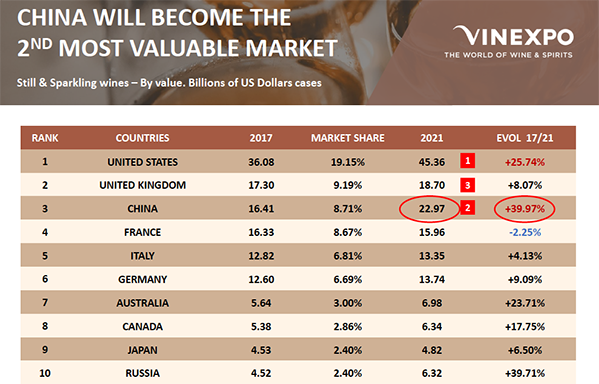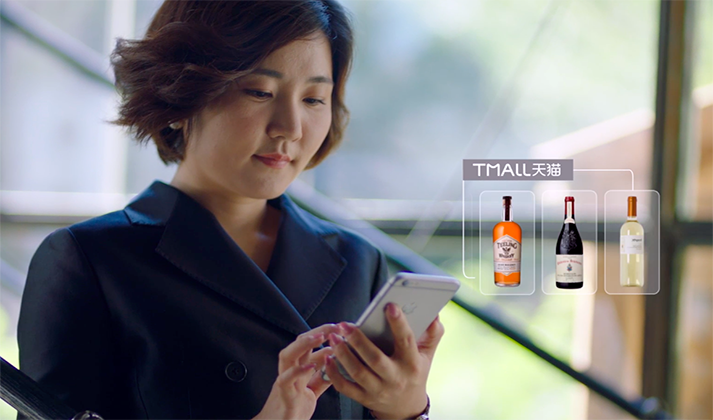
From promoting its ancient growing techniques to the trusted taste buds of a sommelier, the process of bringing wine to the market has barely changed for hundreds, if not thousands, of years.
But Tmall, China’s leading B2C online marketplace, wants to give wine consumption a 21st century upgrade.
At Vinexpo Hong Kong on Wednesday, a semiannual confab focused on the Asia Pacific region, Alibaba Group-owned Tmall unveiled a host of new technologies for the industry that are a long way from the grape-stomping and oak barrels of old.
Tmall showcased a “Future Bar,” which included facial-scanning for entry, a robot waiter, RFID technology to enhance browsing, touchscreen displays for product research and a “Smart Wine Cooler.” The technologies are part of a larger trend in “New Retail,” an initiative in China led by Alibaba to merge the best of online and offline commerce for the benefit of both consumers and merchants.
More on Tmall and China’s Wine Market:
- Vinexpo Partners With Tmall to Boost China Profile
- Tmall Issues ‘Michelin Guide for Wine’
- Canada’s Summerhill Says China May Soon Be Its Top Wine Market
- Three Tips for Selling Wine to China From Mondavi
- WATCH: Mondavi Wins Hearts and Wines in China Through Tmall
Mike Hu, a senior director at Tmall, said the goal of New Retail is to make shopping more personal, more engaging and more convenient — even in traditionally stodgy industries such as wine.
“China really is at the forefront of consumer engagement right now,” Hu said. “Shopping here is mobile, it’s fun, it’s interactive, and the wall between e-commerce and brick-and-mortar stores is coming down. This kind of comprehensive shopping experience is what Chinese consumers have come to expect, so wine sellers need to adapt if they want to be successful here.”
Upon arriving at Alibaba’s booth, attendees were greeted by the Tmall Robot Waiter, who asked, “Hey, don’t you want to have a drink?” — in multiple languages. The advanced human-computer interaction offered a glimpse of the future for wine merchants and their customers, Hu said.
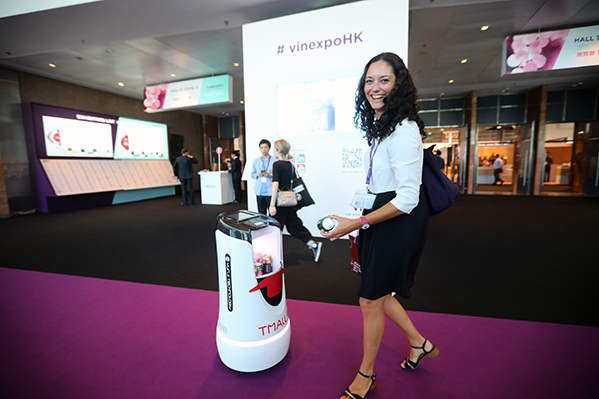


Facial scanning, meanwhile, offered entry to the booth and pointed a still-growing but soon-to-be important part of the consumer experience in China: facial-recognition payments, Hu noted. Already, Alibaba’s supermarket chain, Hema(now also known as Freshippo), has implemented the technology in one of its Shanghai stores. It is being tested in a cashierless store at Alibaba’s Hangzhou headquarters as well.
The RFID technology was embedded in the foil wrapping that covers the cork so that when they were picked up from a shelf, their product information was displayed on a nearby screen. So, too, were recommendations for food pairings.
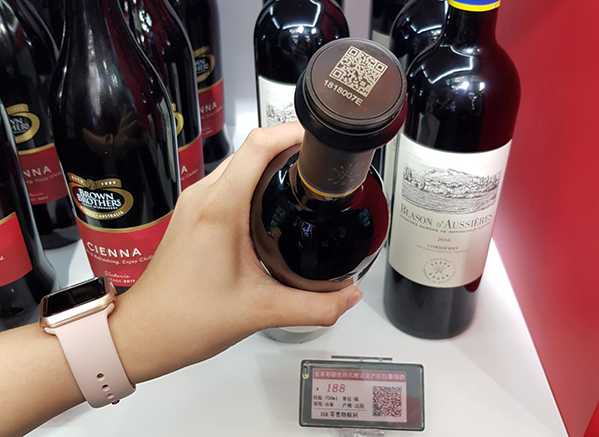


Touchscreens at the booth allowed visitors to research a wine’s home chateau and place orders through the brand’s Tmall flagship store. This kind of setup would save much-needed stock and shelf space for retailers, Hu said, while providing greater selection for consumers visiting the shop and offering delivery direct to their homes.
Users of Tmall’s Smart Wine Cooler scanned a QR code to open the cooler door, after which they could choose their favorite bottle and then simply close the door again to pay automatically. Or, as Tmall put it, “close the door, the deal is done.”
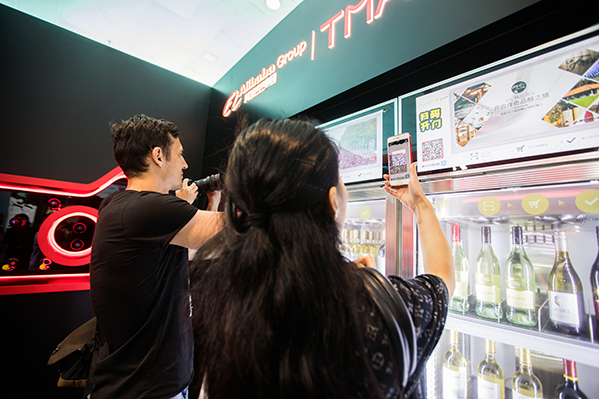


Ecommerce marketplaces, such as Tmall, are playing an important role in China’s wine market, said Guillaume Deglise, CEO of Vinexpo. Not least because the brick-and-mortar retail business is not on par with other markets.
“It’s very difficult to find very good shops in China, especially in tier-two and tier-three cities,” Deglise said. “So, e-commerce is changing this.”
Also, younger consumers in China are more used to online shopping than their peers in the U.S. and Europe, he said, “so the distribution will be different in China than the rest of the world.”
Asia, overall, is driving global growth in the wine market, according to a new report from Vinexpo. And China is leading that trend. The country was the world’s third-largest importer in 2017 by value, at $16.41 billion, behind only the U.S. and U.K. By 2021, however, China will overtake the U.K. in the number-two spot with $22.97 billion—a near 40% jump.
Deglise points to the middle class for these increases, especially those in urban centers, such as Beijing and Shanghai. An uptake among women is also playing a role, as is a general trend toward wellness in China that has people reaching for vino instead of the country’s traditional “baijiu” hard liquor.
Then, there’s travel to markets where wine is already popular, such as the U.S., Europe and Australia, which gives Chinese consumers the chance to try new varieties.
“When they come back home they tend to drink more wine than before,” Deglise said.
This means that wine-producing countries will benefit, he added. Vinexpo expects almost all producing countries to increase their exports to China over the next five years, making China the only market to prompt such demand.
“All producing markets are depending on China,” Deglise said. “It’s a huge market with tremendous potential.”
Alibaba signed two memoranda of understanding at Vinexpo on Wednesday, with governmental organization Wine Australia and French wine critics Bettane & Desseauve. Tmall will work to market Australian wines on the platform and support Wine Australia’s marketing efforts around major events such as the 11.11 Global Shopping Festival. For Bettane & Desseauve, Tmall will use their reviews to complement its wine listings while also hosting their annual top wine lists as they are released. They will also partner on offline wine events in China.
